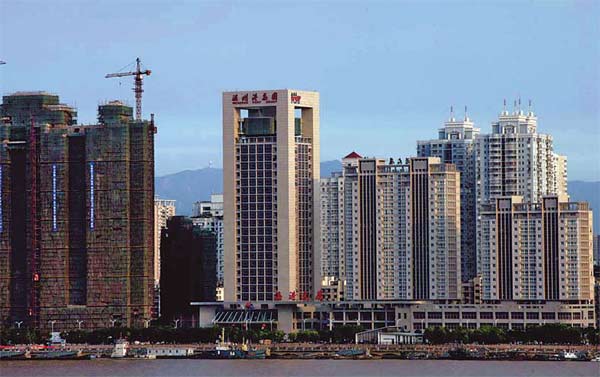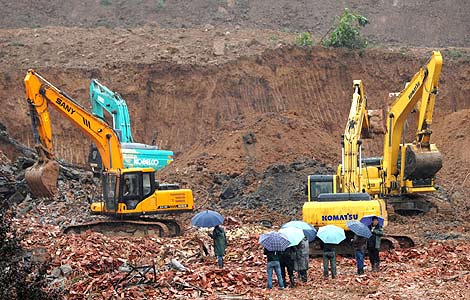Property developer going underground
Updated: 2011-09-19 07:01
By Yu Ran (China Daily)
|
|||||||||||
Real estate projects under construction in Wenzhou, Zhejiang province. Many local developers have turned to underground financing as China tightens bank lending policies. MING XUAN / FOR CHINA DAILY
Tightened lending forced developers to turn to underground financing

SHANGHAI - Months before the central government declared war on the "gray" money market, merchants in Wenzhou had sensed the coming showdown and rushed to dump the properties they'd acquired with loans from underground lenders.
The sell-off has sent property prices in Wenzhou's secondary market tumbling by at least 10 percent since June. If you think that's just a minor blip, picture this: property prices in this Zhejiang province boom town have soared by an average 20 percent in each of the past 3 years. Indeed, most Wenzhou residents can't remember the last time they saw a decline in property prices.
Real estate agents in the city said they have been flooded with sales orders. "My clients are dumping their property holdings not only in Wenzhou, but also in other cities," said Zhao Xiuqin, a sales manager at a local property agency. "It's a stampede, like animals running for their lives from a wild bushfire," she added.
This figurative fire was apparently set by the government. In reaction to growing public discontent about escalating property prices, the authorities introduced various measures to clamp down on excessive speculation. A major thrust of those efforts involved the tightening of bank credit.
China's year-on-year consumer price inflation reached 6.5 percent in July, the fastest pace in 37 months and well above the government's 4 percent target for the year. It eased to 6.2 percent in August, but government officials have hinted that the full-year target may not be met.
The People's Bank of China (PBOC), the central bank, has raised interest rates three times this year, taking the one-year benchmark deposit rate to 3.5 percent and the one-year lending rate to 6.56 percent.
The bank also has increased the reserve-requirement ratio for commercial lenders six times, pushing it to a record 21.5 percent.
In addition, the PBOC has reiterated its commitment to reining in the underground lending market that has been most active in Wenzhou.
"To crack down on illegal underground banking is the current focus of the government to regulate the private financial market and get the risks of private lending under control," said Vice-Premier Wang Qishan at the end of August.
Wang added that it's important to improve the financial market environment with restrictions while ensuring that small and medium-sized enterprises (SMEs) have access to loans to support growth.
His remark caused anxiety in the minds of many Wenzhou merchants who have been funding their speculative exploits, mainly in the property markets in a number of mainland cities and Hong Kong, with loans from the city's underground banks.
A survey by the Wenzhou branch of the PBOC on the best investment method in the second quarter saw property investment knocked off the top spot for the first time since 2009, witnessing a decline of 5.2 percentage points compared with the same period last year.
Even those at the top of the property food chain are feeling the pinch. Tightened bank credit has forced many developers to borrow from the underground lenders - a practice that is quite common among business people in this prosperous eastern city - to cover their short-term funding needs.
"Most of us property developers have to borrow short-term money with high interest rates from underwriting companies or private money lenders for about a week every three months if we have a new project to launch," said one property developer, who was unwilling to be identified.
He added that there was a risk that he might not have enough money to pay back his high-interest loans if the number of buyers continues to decline.
In addition, many SMEs that have been starved of loans as the country tightens credit in its fight against rising inflation, are driving an underground banking boom by turning to unofficial funding sources to survive.
About 80 percent of the SMEs in Zhejiang province are using underground banking loans to fund their businesses, even though black market interest rates in the province have surged to as much as 10 percent a month, according to statistics provided by the provincial government.
"Only about 10 percent of SMEs are able to obtain loans from banks or authorized underwriting companies, with 90 percent left to solve their financing problems through underground banking," said Cao Hua, a local underground banking operator, who is in charge of money gathering and lending to companies.
Beijing has tightened its monetary policies this year to combat inflation that has risen relentlessly after the country launched a $586 billion stimulus program in late 2008 following the eruption of the global financial crisis. An influx of capital from international investors as a result of looser monetary policies in some developed economies has also contributed to the problem.
"Usually, those State-owned enterprises are able to obtain bank loans at an interest rate of about 7.2 percent, compared with the one-year benchmark interest rate of 6.56 percent, but SMEs can only borrow money at higher rates from third-party companies or private lenders like us," said Cao.
She added that the majority of her clients are local SMEs that need to take short-term loans from time to time to maintain their ongoing production.
With the tightened lending policies, the amount of overall yuan lending increased by 16.4 percent year-on-year in August, 0.2 of a percentage point lower than the previous month and 2.2 percentage points lower than in August 2010, according to the central bank.
"Small and medium-size firms, which are already burdened with the rapid rise in labor costs and the soaring price of raw materials, are facing financing problems as well," said Zhou Dewen, chairman of the Wenzhou SMEs Development Association.
Zhou added that the increases in the official interest rate and reserve-requirement ratio have raised the cost of financing among SMEs by about 40 to 50 percent compared with last year.
Private underground lenders are particularly active in Wenzhou, a city that has boomed over the past three decades by producing a wide range of consumer goods. This, along with similar activity in other manufacturing hubs in the east and southeast of the country, has helped China become the workshop of the world.
The accumulation of wealth as a result of manufacturing has also led to ample liquidity in the local market. The black market in Wenzhou is threatening to replace local banks as the major source of funding to finance the town's undiminished building boom. Staying out of sight, the key market players are the many underground lenders, operating in a legal gray area to take deposits and make loans at interest rates that can go as high as 200 percent a year.
In July, Wenzhou's underground banks processed 110 billion yuan ($17.2 billion), about 40 percent more than the 80 billion yuan processed in the same month a year earlier and equal to more than one-third of the city's entire 2010 GDP of 292.56 billion yuan, according to statistics from the Wenzhou branch of the PBOC.
However, the high risks inherent in underground banking have inevitably damaged the city.
Starting at the beginning of April, many SME owners disappeared after failing to pay back money they'd borrowed from underground banks. Huang He, the chairman of Wenzhou Jiangnan Leather Co Ltd, closed down his factory without warning, owing billions of yuan to workers and money lenders.
"I came to work as usual in the morning and discovered that the gate was shut and a group of people had gathered outside the factory asking the boss to return their money," said a former worker who would only give his surname as Yao.
He added that he still hadn't received his salary for March and April and he isn't expecting to get his money after learning that Huang is alleged to have moved overseas.
Wenzhou Shoes Material Co Ltd unexpectedly ceased production on Aug 29, and just a few days ago, the boss of Wenzhou Jinchao Electrical Appliances Co, located in southeast Wenzhou's Yueqing city, was also reported to have gone to ground. There has subsequently been speculation that he is in trouble with an underwriting company.
Wenzhou Tietong Electrical Equipment and Alloy Industry Ltd Co, Wenzhou Shoes Material Ltd Co and Wenzhou Jinchao Electrical Equipment Ltd Co all fell into the same trap in August.
"All those businessmen had become involved in borrowing money from underground banks and they failed to return the money with the high, ever-increasing interest on time," said Xu Liangxi, deputy director of the Wenzhou Marketing Management Association. "The vicious circle has already started to devour the companies' capital, causing problems for firms that have been in operation for 10 to 20 years."
As a result of these defaults, the private money lenders have started to worry about the increasing risk of lending money to SMEs.
"Most of us have been scared by the recent mass defections of businessmen so we have to double check all company information in detail before lending money, and a written IOU is essential now," said Wang Jianxiao, the owner of a private underground bank in Wenzhou who used to lend millions of yuan to SMEs during the peak period without any formal IOUs.
Wang added that the tightened loan policies have restricted the cash flow for businessmen, forcing them to return the money to the lenders.
Most of the money lenders and collectors have temporarily ceased loaning large sums because they are wary of losing out.
"The collapse of the underground banks, which would be the worst consequence for the private money lenders and borrowers in Wenzhou, will become reality sooner or later if the cash-flow problem is not solved," said Chen Gongmeng, chairman of Wenzhou Strategic Investors Federation.
Chen added that hopefully the official bank loans policy will be loosened and that more underwriting companies will lend money to SMEs at lower interest rates than those offered by the gray-market lenders to ease a situation that has the potential to become severe.
China Daily
(China Daily 09/19/2011 page13)
Hot Topics
Organ transplant bonds mother and son
Editor's Picks

|

|

|

|

|

|






